How to Calculate ERP ROI for Small Manufacturers
In today’s unusual capital markets, investment opportunities are so moribund that some European banks are offering negative interest rates (i.e., charging you money), to put your cash in their vaults. Under conditions like these, all of the math and finance terms you learned while getting your MBA are of questionable value; does a hurdle rate of 0% really convey any meaningful business information? Common sense may provide better guidance on ERP ROI than any mathematical calculations.
For the purpose of discussion, let’s assume the manufacturing ERP software package that is best suited for you would cost $100,000, totally installed and operational. That’s a little bit more than you had budgeted, but the difference between the next best package that would come in at budget and this one is night and day as far as a good fit for your business model. Now the question is, can you justify it in your mind?
If you use conventional wisdom, and want a fair, but competitive return, you need to guess at two things: (1) how long will the ERP software be in use and (2) what would be a reasonable return over the course of that time period. If your two guesses are (1) five years and (2) 7%, then you would have to feel comfortable that you could save (or grow profits) $27,000 a year ($100,000/5 years + $100,000 x 7%). If you saved more than $27,000 a year, or the ERP system lasted longer than five years, your investment gets that much more attractive. The common sense part of the decision is thinking about whether or not you can realistically save that money.
Aiming Higher
However, you didn’t build your own successful manufacturing business by following conventional wisdom, nor should you when evaluating the ROI of your ERP system. You should, instead, aim for high, bold objectives, with financial payback percentages in triple or even quadruple digits. This level of ERP ROI isn’t unreasonable if you frame your requirements to deliver two or more strategic improvements. Don’t settle for the objective of your manufacturing ERP system being to just reduce costs; insist that it allows you to simultaneously reduce costs, improve service, and reduce inventory. When you set that as your solution space, your business team begins thinking about, and working on, a totally different – and typically more creative – set of solutions to your business problems. What you define your problems to be is up to you, but by using ERP to make progress on multiple fronts, you are in a position to recoup more on your investment than a large, conventional company might.
As you think about it, setting a high goal for manufacturing ERP ROI is not wishful thinking. If your computer system can allow you to avoid hiring one more management person, or two more administrative people, you are approaching a one-year payback. Your ROI should not be a close call - you should know for certain that you are going to get a good financial return from an ERP system.
Free white paper
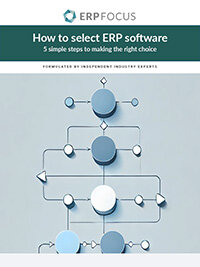
How to Select ERP
Learn to select your ERP in 5 easy steps by following our expert's advice
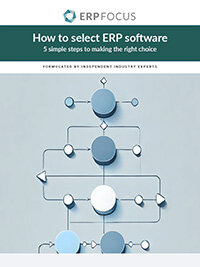
Featured white papers
-
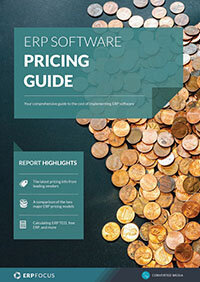
ERP Software Pricing Guide
Get the latest pricing information on over 80 popular ERP systems, and learn how to budget for your ERP project in our free guide
Download -
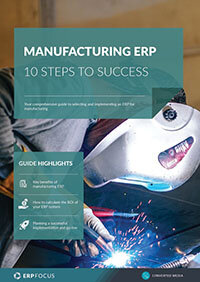
Manufacturing ERP: 10 steps to success
Complete step-by-step guide to manufacturing ERP software
Download -
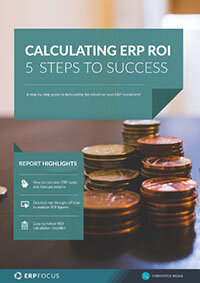
Calculating ERP ROI: 5 steps to success
Calculate your new ERP's financial benefits with this comprehensive guide
Download
Related articles
-

4 training tips for manufacturing ERP success
These four training tips will help your employees get the most out of your new manufacturing ERP ...
-

Secret KPI: Why Your ERP Implementation Team Matters More Than Software
Learn how Godlan ensures successful ERP implementation for manufacturers with proven strategies &...
-

ERP for make-to-order manufacturing
How can ERP help your make-to-order manufacturing business thrive?

